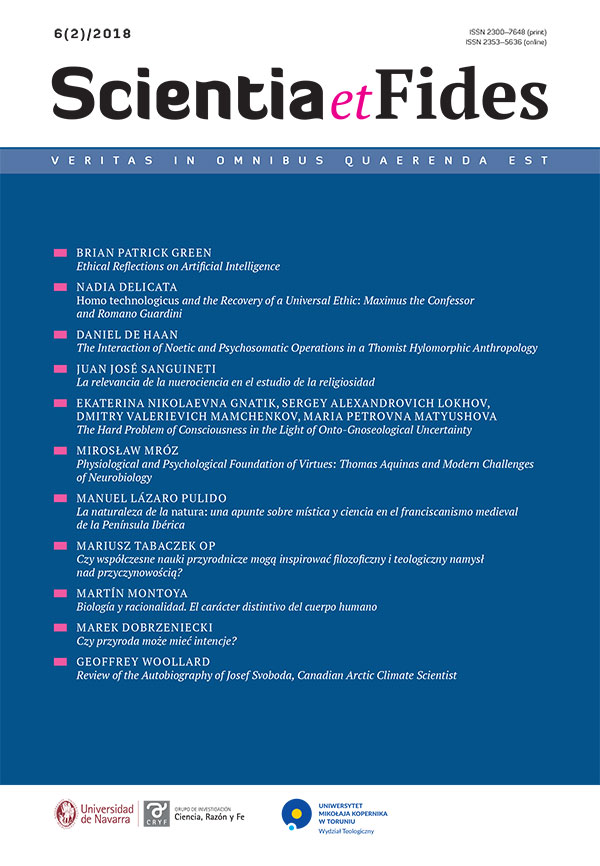Homo technologicus and the Recovery of a Universal Ethic: Maximus the Confessor and Romano Guardini
Keywords
technological human, techne, theological anthropology, Laudato Sì, natural lawAbstract
On September 1st2017, Pope Francis and the Ecumenical Patriarch Bartholomew issued a Joint Message for the World Day of Prayer for Creation. The gesture reveals the church’s efforts “to breathe with two lungs” on the urgent matter of climate change and ecological sustainability. But, the church leaders have also insisted on a philosophical and religious reflection on technology if humanity is to take responsibility for the environment. In particular, they have sought to correct the wrong interpretation of the biblical imperative to “have dominion over” (Gen 1:26) the creatures of the Earth and to “subdue it” (Gen 1:28) that for centuries has condoned ecological abuse, in particular in the name of technological progress.
In this paper, I propose a theological reflection on Homo technologicusthrough the writings of the seventh century monk Maximus the Confessor and the twentieth century Catholic priest Romano Guardini. Maximus offers a systematic account of human techneas reflecting the mark of sin, while being God’s gift to assist us in stewarding creation. Guardini offers a challenging argument for the moral nature of technology in our times. In an age where technology extends human power, even as it seemingly takes on a life of its own, Maximus’ and Guardini’s insights on the “technological human” offer a renewed Christian anthropology that, in the tradition of natural law reasoning, can ground a global ethic for a “sustainable and integral development.” (Joint Message, 2017)
References
Bulgakov, Sergius. 2002. The Bride of the Lamb. Translated by Boris Jakim. Grand Rapids, MI: Eerdmans.
Catechism of the Catholic Church. 1993. Vatican City: Libreria Editrice Vaticana, http://www.vatican.va/archive/ENG0015/_INDEX.HTM
Delicata, Nadia. 2015. “Natural Law in a Digital Age.” Journal of Moral Theology 4:1-25.
Guardini, Romano. 1998. The End of the Modern World. Wilmington, DE: ISI Books.
Jesuit European Social Centre. 2015. “Global response to Laudato sì.” Last modified November 4. http://jesc.eu/global-response-to-laudato-si/
Lollar, Joshua. 2013. “Pathos and Technê in St Maximus the Confessor.” In Knowing the Purpose of Creation through the Resurrection, edited by Maxim Vasiljevic, 223-238. Belgrade: Sebastian Press. (Kindle ed.).
Martinho-Truswell, Antone. 2018. “To automate is human.” Aeon, February 13. Accessed February 14, 2018. https://aeon.co/essays/the-offloading-ape-the-human-is-the-beast-that-automates.
Maximus the Confessor. 2014. “Ambiguum 45.” In The Ambigua: On Difficulties in the Church Fathers, vol. 2. Edited and translated by Nicholas Constas, 192-201. Harvard University Press.
Pope Francis. 24 May 2015. Laudato Sì. http://w2.vatican.va/content/francesco/en/encyclicals/documents/papa-francesco_20150524_enciclica-laudato-si.html
Pope Francis. 1 September 2015. “Letter of His Holiness Pope Francis for the Establishment of the "World Day Of Prayer For The Care Of Creation".” https://w2.vatican.va/content/francesco/en/letters/2015/documents/papa-francesco_20150806_lettera-giornata-cura-creato.html
Pope John XXIII. 1 April 1963. Pacem in Terris. http://w2.vatican.va/content/john-xxiii/en/encyclicals/documents/hf_j-xxiii_enc_11041963_pacem.html
Pope Paul VI. 7 December 1965. Gaudium et Spes. http://www.vatican.va/archive/hist_councils/ii_vatican_council/documents/vat-ii_const_19651207_gaudium-et-spes_en.html
Downloads
Published
How to Cite
Issue
Section
License
CC BY ND 4.0. The Creator/Contributor is the Licensor, who grants the Licensee a non-exclusive license to use the Work on the fields indicated in the License Agreement.
- The Licensor grants the Licensee a non-exclusive license to use the Work/related rights item specified in § 1 within the following fields: a) recording of Work/related rights item; b) reproduction (multiplication) of Work/related rights item in print and digital technology (e-book, audiobook); c) placing the copies of the multiplied Work/related rights item on the market; d) entering the Work/related rights item to computer memory; e) distribution of the work in electronic version in the open access form on the basis of Creative Commons license (CC BY-ND 3.0) via the digital platform of the Nicolaus Copernicus University Press and file repository of the Nicolaus Copernicus University.
- Usage of the recorded Work by the Licensee within the above fields is not restricted by time, numbers or territory.
- The Licensor grants the license for the Work/related rights item to the Licensee free of charge and for an unspecified period of time.
FULL TEXT License Agreement
Stats
Number of views and downloads: 715
Number of citations: 4



